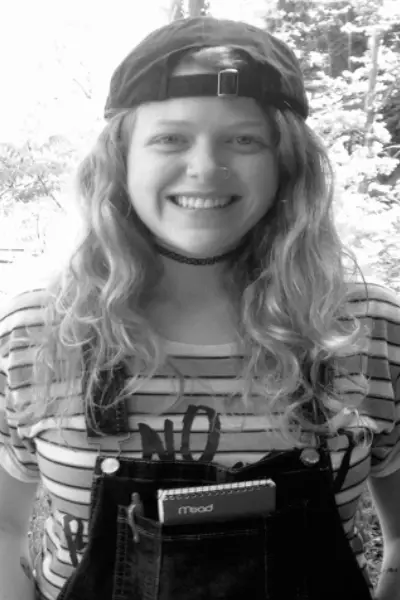Evelyn Atieno’s the founder of “Affinity Magazine,” an online publication written by teenagers for teenagers. Her goal was to encourage them to write about real life—dark experiences, pop culture, feminism, social justice, politics, gender, sexual orientation and to promote inclusivity. “I had stacks of ‘Teen Vogues’ in my room,” said Atieno over the phone. “The outfits [featured were] $600. What teenager can afford that? This is ridiculous. This is not real life.”
What’s more, Atieno didn’t appreciate adults writing for and pandering to teenagers. Thus, “Affinity Magazine” was born because of one simple question: Why can’t teenagers write for themselves while discussing adult topics?
“Affinity Magazine” was an online blog created by Atieno in February, 2013, at only 16-years-old. A few months down the line, she began publishing monthly print issues covering topics like “tips for freshman” and “graduating high school.” Today, Evelyn Atieno’s “Affinity Magazine” is a website where content is uploaded daily. In just one year, over one million people have viewed the website (currently averaging 120,000 views a month), and the verified Twitter account has nearly 33,000 followers. Atieno group chats with 177 teenage writers and 4-5 editors—the acceptance rate is 34 percent for all new applicants.
“Most magazines where you contribute [your work], you don’t know the other writers. My writers, we talk everyday, collaborate and help each other with articles,” said Atieno. Her writers are responsible for one article a week, but are constantly reminded, “School comes first. Mental health comes first.” “Affinity is more than a magazine, it’s a movement. It’s different—teenagers [are] writing about serious issues, like what’s [currently] happening in Syria, but condensing in a way where everyone can understand,” said Atieno.
In order to gain followers and verification on Twitter, Atieno conducted research. She said, “People will say they’re going to start something, and they don’t do research. You have to figure out your demographic. Who are you going to sell to? How are you going to appeal to them?” Atieno quickly realized her demographic was teenagers who are interested in feminism and social justice. She took to Twitter to find those people. “I followed [teenagers] who [tweeted about] social justice. [I know] people are into ratios: Not following as many people [in comparison to followers]. Why? If you want people to notice what you do, you should follow them so they can see,” said Atieno. Twitter has a verification form you can fill out. Atieno said, “I signed up, but didn’t think about it much. Two weeks later “Affinity” was verified.
“People take us seriously. The verification helps [because] ‘Affinity’ is the underdog in a world full of so many teenage magazines. [People say], “Since they’re 16, I don’t believe them,” but we know what we’re talking about.” According to Atieno, “Affinity Magazine” has been cited on Mic.com, “New York Times,” “Slate Magazine” and “Huffington Post” as a credible source. Atieno’s social media success continues to grow, much like her confidence as a college student and writer as she uses her “Affinity Magazine” experience to pursue life-altering opportunities. She said, “If an article I write gets a lot of buzz on Twitter, I submit it to bigger publications.”
7 Questions for Evelyn Atieno
1. How does social media affect your experience as a college student?
I’ve been featured on my school’s website twice because of “Affinity.” If you go on “Affinity’s” website, [it’s not clear] who started it. There’s no profile of me. I like to keep my life private. I don’t want to be famous. The platform, I created it so others can get their voices heard.
2. How do you think Twitter affects the college experience?
College students like to get their news quickly. With Twitter, people can see what’s going on [as it happens]. They wake up, and [Twitter] gives them information. It’s a good way to communicate with friends quickly. What’s bad is: You can say crazy things on Twitter. People can find out where you go to school, and your college career will be over as fast as it started. With Twitter polls, you can ask people questions. [When conducting research], you can say, “According to these people on Twitter…”
3. What’s your opinion on Twitter as a platform to expose injustices?
It’s great. You can tweet something and get 10,000 retweets in an hour. It’s a faster way of exposing what’s happening in the world.
4. What sets you apart from others who try to run successful Twitter accounts?
I’m laid back, and “Affinity” replies back. You can tell by the account “Affinity” is sincere, I care about what people say. I’m still not understanding why “Seventeen” doesn’t reply back—they don’t have a connection to the people [reading their work]. [Readers] will [tweet], “This article really spoke to me.” “Affinity” will reply back, because I really do care.
5. How has Twitter impacted your studies as an International Affairs major?
I’m really [interested] in international news. I see articles about Palestine and Europe [on Twitter]. It really helps me, because 95% of my news I get from Twitter. I’m always on Twitter.
6. How has Twitter changed the way you go about seeking internships, or employment post-graduation?
EA: “You can find so many [opportunities]. “BuzzFeed” has [an Emerging Writers] Fellowship, and “New York Times” has summer internship programs. You can literally search for internships on Twitter, and a whole bunch will pop up.”
7. How has “Affinity Magazine” given students across the country different opportunities?
EA: “My editors [usually] start out as writers. As they grow professionally, I promote them. Recently, a writer wrote an article for us, [but it] was so good, I told him to pitch it to an editor I know at “Huffington Post.” They ended up running the article, [and] now he writes for them [regularly]. Another writer got into their dream school because of [their experience with] “Affinity.” One writer had an interview at Brandeis University. The interviewer heard of “Affinity,” and let my writer apply late to [participate in] an overnight program at the university. Another writer interned at “Cosmopolitan India” over the summer.”









